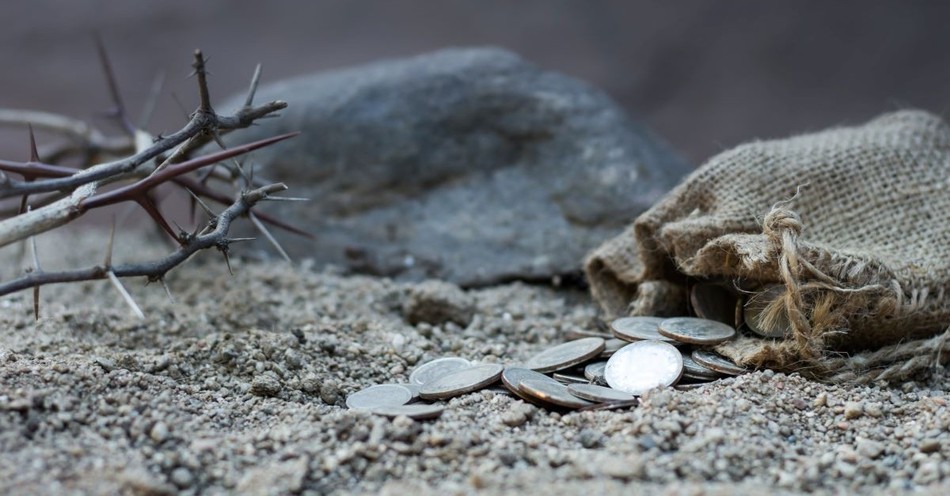One of the classic movies about Jesus is The Greatest Story Ever Told, released in 1965. We watched it every Easter growing up, a major TV event. I always loved the title.
Perhaps we become too familiar with the stories of the Bible. However, upon examining the drama throughout Scripture, even objectively, we find amazing and miraculous accounts. And when reading about Jesus in the gospels, especially the events surrounding the crucifixion. Within the death of Christ, we find numerous connections with Old Testament prophecies, as Matthew particularly points out.
One of these details is what Matthew shares about Judas and his betrayal of Jesus. The council takes the silver coins and buys a piece of land. While it might seem minor, the gospel shares it for a reason.
What Does the Bible Say about Judas’ Betrayal?
Jesus chose Judas Iscariot as one of the twelve main disciples, trained to become an apostle. Unfortunately, Judas betrayed his master, revealing one of the most heartbreaking and sobering events in Jesus’ life. Each of the four gospels includes it, emphasizing different elements of the story.
In the text, Judas agreed to betray Jesus for money. We can theorize about other deeper motivations, but greed was a part of it. Jesus and the disciples knew the religious leaders sought to kill Jesus, so Judas went to the chief priests and asked, “What are you willing to give me if I deliver Him to you?” They paid him thirty pieces of silver, coins, which would be three or four months' average salary. In addition, this was the price of a slave in the Old Testament Law, Exodus 21:32. From that moment, Judas looked for a way to get Jesus arrested.
John’s Gospel also details how Judas was placed in charge of the ministry’s money, kept the money bag, and would regularly steal from it (John 12:6).
Luke 22:3-6 records that “Satan entered Judas,” influencing him to betray Jesus. During the Last Supper, Jesus pointed out Judas as the one who would betray him. Jesus handed the betrayer a piece of bread and said, “What you are about to do, do it quickly.” (John 13:27) Judas left the dinner to find the chief priests.
Jesus led the disciples to the Garden of Gethsemane, and Judas led a crowd of soldiers there. Judas told the armed men he would give them this sign: “The one I kiss is the man; arrest him.” (Matthew 26:48) Judas approached Jesus and kissed him, a cultural greeting between brothers, close friends, or a disciple and teacher, making the betrayal even worse.
After Jesus’ arrest, Judas realized his mistake and felt remorse. He brought the money back to the chief priests in the Temple, some attempted to reverse his actions, saying, “I have betrayed innocent blood.” (Matthew 27:3-5) The religious leaders dismissed him. Judas threw the money at them, ran away, and hung himself. As a deeper tragedy, Judas didn’t try to repent or seek forgiveness. Hopeless, he killed himself.
Why Did the Council Use the Silver Coins to Buy a Field?
The Jewish council took the money Judas returned and bought a field. They also considered the 30 silver coins as “blood money,” so they couldn’t put the money back into the treasury. They said, “Is it not lawful to put them into the treasury, since it is blood money?” (Matthew 27:6-7) Instead of keeping it, they used it to buy land. Even though they were the ones who used the money to get Judas to betray an innocent man, now they claimed religious morality and standards.
The chief priests’ decision showed their awful hypocrisy, consistent with their actions throughout the gospels. They had no issue planning to kill Jesus, publicly decrying Christ as a blasphemer. Yet here they admit to Jesus’ innocence and the evil done to him. Their choices reveal how religion is twisted and evil, apart from true devotion to God. Their sin and pride blinded them, making them legalistic. They followed rules about Temple money while excusing the killing of the very Son of God who came to save them.
The priests bought the Potter’s Field as a place to bury foreigners. A potter’s field probably had poor soil, used for digging clay or pottery instead of agriculture. While the priests probably didn’t mean to use it for a good purpose, it’s fitting that Jesus’ betrayal money went to help the poor and foreigners, the outcasts he loved to minister to. The field became known as Akeldama, or Field of Blood, since it was purchased with blood money, both Jesus' and Judas’s gruesome death nearby (Acts 1:18-19).
Tradition places the Field of Blood in the Hinnom Valley, south of the older city of Jerusalem. The same valley had long been associated with death and burial, at one point used for pagan child sacrifice to the idol Molech (Jeremiah 7:31-32). Some early Christian, extrabiblical sources also record it as a burial ground during this time.
How Did this Fulfill the Old Testament?
Matthew clearly shares this detail about the Potter’s Field since it connected with Old Testament prophecy. “Then what was spoken by Jeremiah the prophet was fulfilled: ‘They took the thirty silver coins, the prices set on him by the people of Israel, and they used them to buy the potter’s field, as the Lord commanded me.’” (Matthew 27:9-10)
This passage blends two Old Testament prophecies from Zechariah and Jeremiah. In Jesus’ days, the prophetic scroll (which might have included Zechariah) was named after Jeremiah, and most synagogues would have had this scroll as a collection of prophets. Therefore, other prophets were often quoted alongside Jeremiah, much like we might say, “As it says in the New Testament,” and provide a quote from Paul.
In Zechariah 11:12-13, the prophet writes about a rejected shepherd and an ungrateful people. The shepherd asks for the money due him, and they give him thirty pieces of silver, which would have been considered an insulting amount, as the price of a slave. God tells Zechariah to “throw it to the potter,” a snarky command referring to the contemptible actions of the Jews. Zechariah throws the money into the Temple. For Judas to throw the money in the Temple and for them to buy a Potter’s Field directly fulfills Zechariah’s symbolic vision.
Matthew credits Jeremiah, for reasons we discussed, and we can find similar themes in Jeremiah 19. Jeremiah buys a clay jar and breaks it in the Valley of Hinnom, where the priests later buy the Field of Blood. Jeremiah identifies this valley as the “Valley of Slaughter,” also foreshadowing the betrayal of Jesus and Judas’ suicide.
The council likely didn’t fulfill these prophecies on purpose. Yet Matthew reveals to us that God had a plan all along, and the Old Testament predicted such a betrayal and violence hundreds of years in advance. Even when religious leaders turn to evil, God’s word will prove accurate and faithful.
What Can We Learn from the Field Bought with Judas’ Money?
Greed stands at the core of Judas’ betrayal. Paul taught that the love of money is the root of all kinds of evil (1 Timothy 6:10), leading people to abandon their faith. In addition, Paul lists greed as a lust of the flesh and equates it with idolatry (Colossians 3:5). As a Jew and educated as a Pharisee, equating greed and the love of money with idolatry is a profound statement. Idolatry is also equated with adultery (Hosea 1-4), and idolatry became one of the primary sins (along with oppression of the poor) that got Judah and Israel exiled from the Promised Land (2 Kings 17:7-18).
Judas followed Jesus for years, witnessed his miracles, and heard the teachings of God Himself. But in the end, Judas chose selfish, material gain over spiritual truth. He got the money but realized he truly lost everything. Judas becomes a tragic model for Jesus’ teaching, “Whoever wants to save their life will lose it, but whoever loses their life for me will find it. For what will it profit a man if he gains the whole world and forfeits his soul? Or what shall a man give in return for his soul?” (Matthew 16:25-26)
In addition, the council held religious positions and received education, yet they didn’t love God or seek Him with humility. Their hypocrisy reveals another warning—religious activity and outward tradition don’t change the heart. In fact, even God’s messages can be twisted to serve the self and earthly control and power.
Both these examples should give us pause to examine our hearts. Do we play church or seek God no matter the cost? The modern church still contains regular traditions and outward expressions, but God seeks the heart. He wants our motivation to be pure and to follow him alone from there.
In a culture with rampant commercialism, where everything is “monetized,” and it’s the goal, we must humbly and soberly examine our own hearts regarding greed. We may not have visible idols on every corner, but commercialism still tempts us. Greed and covetousness (wanting what others have) are the same as idolatry and adultery, enemies to the promise and grace of God. As followers of Jesus who went to the cross, he calls us to carry our own cross and give up our own lives.
But not for nothing. And not for a cheap field associated with evil. The lie of greed is that material things matter, but they’re temporary and can’t satisfy what’s important. And they can’t save. God invites us to give our lives, even our material goods, to serve him for a greater treasure we can’t lose: living forever, intimately, with God and reigning with our Father in the Kingdom of Heaven.
Photo Credit: ©GettyImages/gabrielabertolini




.jpg)

